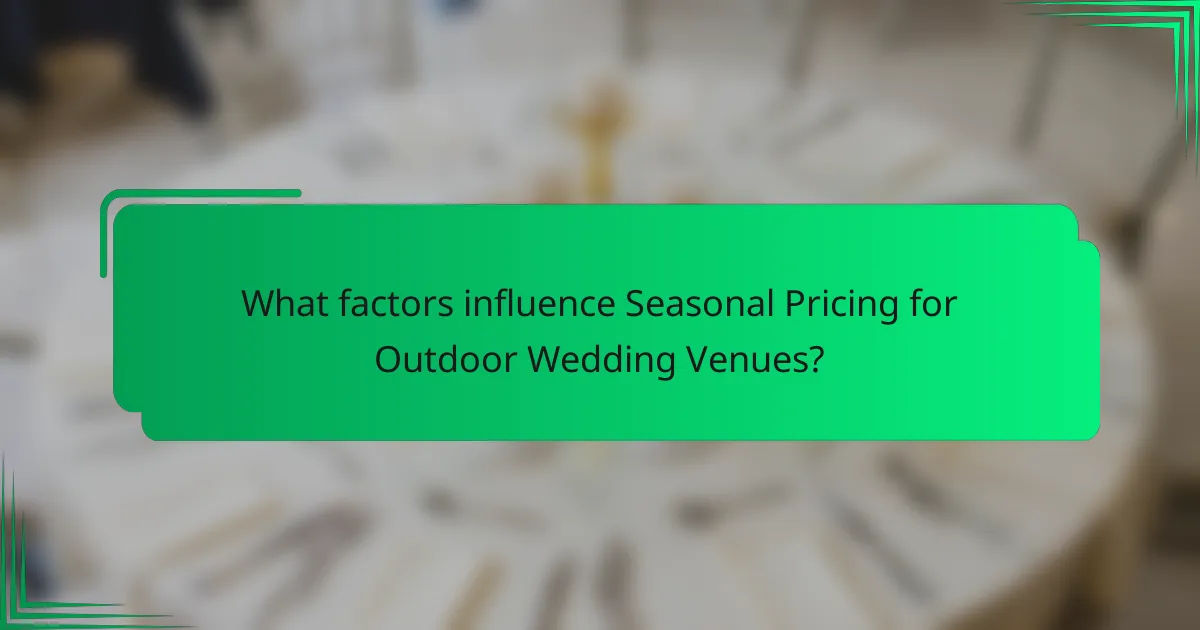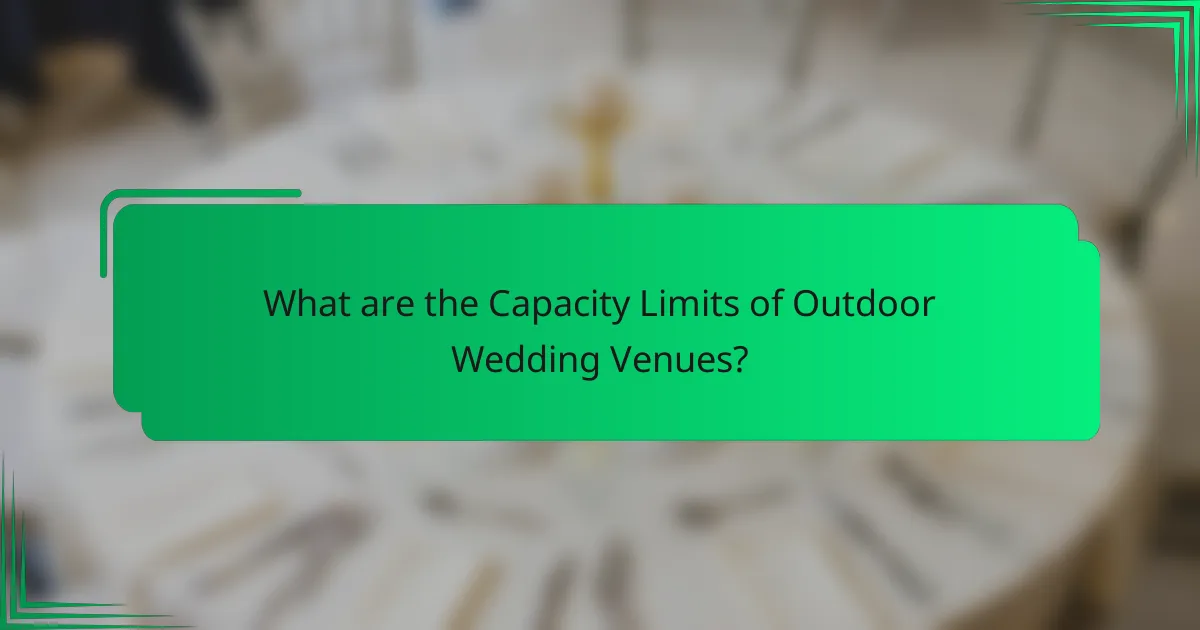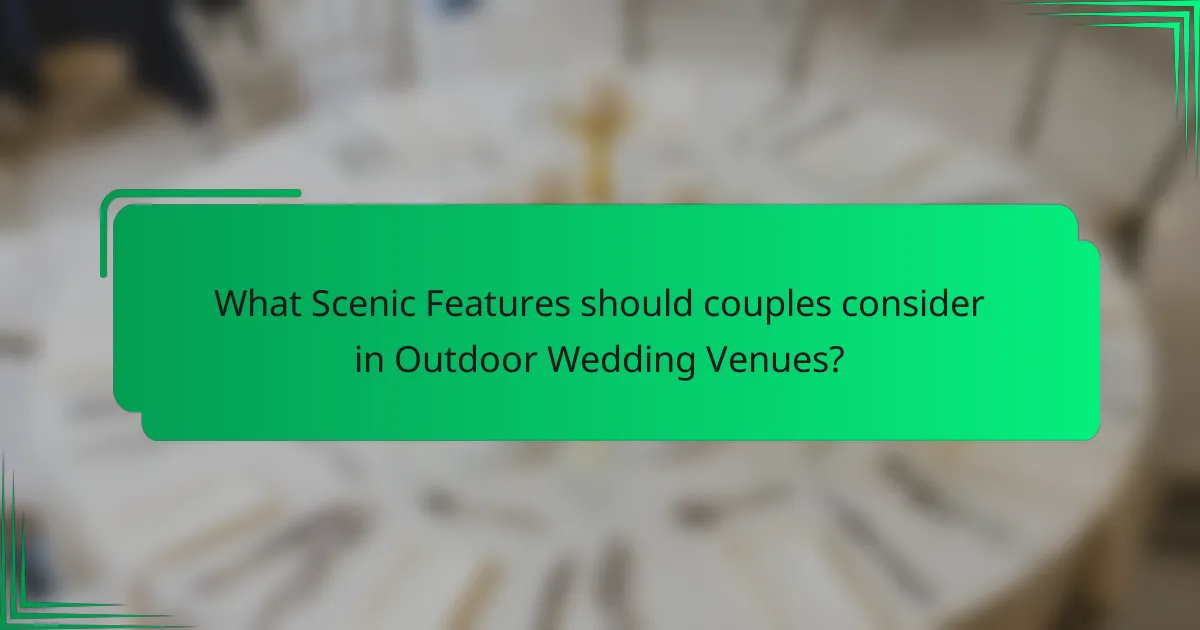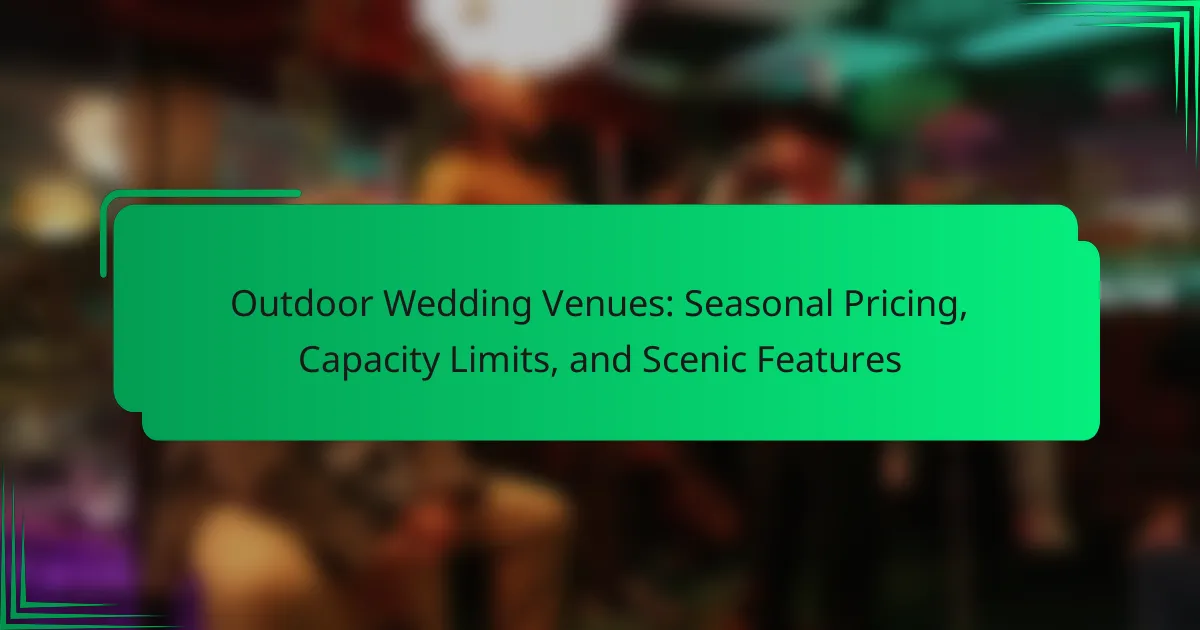Outdoor wedding venues are specifically designed locations for hosting wedding ceremonies and receptions in natural settings, including gardens, beaches, parks, and vineyards. These venues provide scenic backdrops that enhance the aesthetic appeal of weddings and vary in guest capacity, accommodating between 50 to 500 attendees based on space and local regulations. Seasonal pricing is influenced by demand fluctuations, favorable weather conditions, and venue capacity, with peak seasons typically resulting in higher rental costs. Couples should consider the unique features of each venue, such as natural landscapes and accessibility to picturesque spots, to create memorable experiences for their guests.

What are Outdoor Wedding Venues?
Outdoor wedding venues are locations specifically designed for hosting wedding ceremonies and receptions outdoors. These venues can include gardens, beaches, parks, and vineyards. They offer natural backdrops that enhance the aesthetic appeal of weddings. Outdoor venues often accommodate various guest capacities, making them versatile for different wedding sizes. Many couples choose outdoor venues for their scenic features, such as picturesque landscapes and unique settings. Seasonal pricing can affect the cost of renting these venues, with peak seasons typically being more expensive. Additionally, outdoor venues may have specific capacity limits based on local regulations or venue policies.
How do Outdoor Wedding Venues differ from Indoor Venues?
Outdoor wedding venues differ from indoor venues primarily in their location and environmental exposure. Outdoor venues are typically situated in gardens, parks, or beaches, allowing for natural scenery. They often provide scenic backdrops like mountains, lakes, or floral arrangements. Indoor venues, on the other hand, are located within buildings, offering climate control and protection from weather elements.
Outdoor venues may have capacity limits based on available space and seating arrangements in open areas. Indoor venues generally have defined capacity limits dictated by fire codes and building regulations. Additionally, outdoor venues can be more affected by seasonal changes, influencing availability and pricing. Indoor venues tend to have more consistent pricing year-round due to their controlled environments.
Overall, the choice between outdoor and indoor venues significantly impacts the wedding experience, from ambiance to logistics.
What unique features do Outdoor Wedding Venues offer?
Outdoor wedding venues offer natural backdrops that enhance the aesthetic appeal of ceremonies. These venues often feature scenic landscapes, such as gardens, beaches, or mountains. They provide ample space for larger guest lists, accommodating various capacities. Many outdoor venues allow for customizable layouts, enabling unique setups. Seasonal changes add distinct characteristics to the venue, influencing decor and atmosphere. Additionally, outdoor venues often provide fresh air and natural light, creating a relaxed ambiance. Some venues include facilities for both ceremonies and receptions, streamlining the event process. Unique features like fire pits or water features can enhance the overall experience.
How does the setting influence the wedding experience?
The setting significantly influences the wedding experience by shaping the atmosphere and overall mood. Outdoor venues often provide natural beauty, enhancing the visual appeal of the ceremony. The surrounding landscape can evoke emotions, creating memorable moments for couples and guests. Seasonal changes affect the setting’s aesthetics, such as blooming flowers in spring or vibrant foliage in autumn. Capacity limits at outdoor venues can determine guest interactions and overall intimacy. Additionally, specific features like water bodies or gardens contribute to unique photo opportunities. Studies show that natural settings can increase feelings of happiness and relaxation among attendees. Overall, the chosen setting plays a critical role in defining the wedding’s ambiance and guest experience.
What are the advantages of choosing Outdoor Wedding Venues?
Outdoor wedding venues offer unique advantages that enhance the overall experience. They provide natural beauty and scenic backdrops, creating picturesque settings for ceremonies and photographs. Fresh air and open space contribute to a relaxed atmosphere, promoting guest comfort. Outdoor venues often allow for larger guest capacities compared to indoor spaces. Seasonal pricing can be more favorable, especially during off-peak months. Flexibility in layout and design is another benefit, allowing couples to customize their setup. Additionally, outdoor venues can integrate natural elements, such as gardens or water features, enriching the wedding aesthetic.
How do natural landscapes enhance the wedding ambiance?
Natural landscapes enhance wedding ambiance by providing a picturesque backdrop. They create a serene and romantic atmosphere for couples and guests. Natural elements like trees, flowers, and water features add beauty and tranquility. Studies show that outdoor settings improve mood and reduce stress, making weddings more enjoyable. According to a survey by The Knot, 30% of couples choose outdoor venues for their scenic appeal. This preference highlights the emotional connection people have with nature. Additionally, natural landscapes often require less decoration, saving costs while enhancing aesthetic value. Overall, the integration of nature into wedding settings elevates the overall experience for everyone involved.
What cost benefits are associated with Outdoor Wedding Venues?
Outdoor wedding venues often provide significant cost benefits. They typically require less decoration due to natural scenery. This can lead to lower overall expenses for couples. Additionally, outdoor venues may offer flexible pricing options based on the season. For instance, off-peak seasons often come with reduced rental fees. Many outdoor locations also accommodate larger guest lists, which can spread out the cost per person. Furthermore, some venues include amenities like tables and chairs at no extra charge. This can further decrease the overall budget for the wedding. Overall, outdoor wedding venues can be a cost-effective choice for couples planning their special day.

What factors influence Seasonal Pricing for Outdoor Wedding Venues?
Seasonal pricing for outdoor wedding venues is influenced by demand fluctuations, weather conditions, and venue capacity. Demand typically peaks during spring and summer months, leading to higher prices. Conversely, off-peak seasons such as winter may see reduced rates to attract clients. Weather conditions play a critical role, as venues often charge more during favorable weather periods. Additionally, larger venues may have higher seasonal pricing due to their ability to accommodate more guests. Local events and holidays can also impact pricing, as venues may increase rates during these times to capitalize on demand.
How do seasons affect the pricing of Outdoor Wedding Venues?
Seasons significantly impact the pricing of outdoor wedding venues. Typically, peak seasons, such as spring and summer, see higher prices due to increased demand. Many couples prefer these seasons for favorable weather conditions. In contrast, off-peak seasons like fall and winter often have lower prices. Venue owners may offer discounts during these times to attract more bookings. Additionally, specific dates, such as holidays, can also drive up prices. According to a survey by The Knot, 40% of couples choose summer for their weddings, leading to higher venue costs. Thus, seasonal demand directly correlates with pricing strategies for outdoor wedding venues.
What are the peak seasons for Outdoor Weddings?
The peak seasons for outdoor weddings are typically spring and fall. Spring weddings often occur from March to June. This season features blooming flowers and mild weather. Fall weddings usually take place from September to November. Autumn offers vibrant foliage and comfortable temperatures. According to The Knot, about 30% of couples choose these seasons for their weddings. Weather conditions during these months are generally favorable for outdoor events. This trend is supported by wedding industry statistics showing increased bookings during these times.
How does weather impact venue availability and pricing?
Weather significantly impacts venue availability and pricing for outdoor weddings. Adverse weather conditions can limit available dates as venues may close or restrict operations. For example, heavy rain or storms may lead to cancellations or rescheduling, making popular venues less available. Conversely, favorable weather can increase demand, leading to higher prices during peak seasons. Research indicates that venues often charge a premium for summer months due to higher demand and favorable conditions. Additionally, venues may offer discounts during off-peak seasons when weather is less predictable.
What are the common pricing structures for Outdoor Wedding Venues?
Common pricing structures for outdoor wedding venues include rental fees, package deals, and per-person costs. Rental fees typically cover the venue space for a specified duration. Package deals often bundle services like catering, decoration, and coordination. Per-person costs charge based on the number of guests attending. Seasonal pricing may apply, with peak seasons costing more than off-peak times. Some venues offer tiered pricing based on the day of the week. Additional costs may arise for amenities like tents, lighting, and sound systems. These structures allow couples to choose options that fit their budget and needs.
What additional costs should couples consider?
Couples should consider additional costs such as venue rental fees, catering expenses, and decoration costs. Venue rental fees can vary significantly based on the season and location. Catering expenses often depend on the number of guests and menu choices. Decoration costs can include floral arrangements, lighting, and other aesthetic elements. Additionally, couples should factor in costs for permits, insurance, and transportation. These costs can accumulate and impact the overall wedding budget. Understanding these potential expenses is crucial for effective financial planning.
How can couples negotiate better pricing for Outdoor Venues?
Couples can negotiate better pricing for outdoor venues by researching market rates and comparing options. Understanding the average costs in the area helps establish a baseline for negotiations. Couples should also consider booking during off-peak seasons or weekdays when prices are typically lower.
Communicating directly with venue managers about budget constraints can lead to potential discounts. Couples can inquire about package deals that may offer savings on services like catering and decor.
Additionally, leveraging personal connections or referrals may provide leverage in negotiations. Highlighting the potential for positive reviews or future bookings can incentivize venue owners to offer better pricing.
Ultimately, being respectful and flexible during negotiations fosters a positive relationship with venue staff, which can lead to better deals.

What are the Capacity Limits of Outdoor Wedding Venues?
The capacity limits of outdoor wedding venues vary significantly. Most outdoor venues can accommodate between 50 to 300 guests. Smaller venues may host intimate gatherings of around 50 guests. Larger venues can support events with up to 500 guests or more. Factors influencing capacity include available space, layout, and local regulations. For example, a venue’s maximum occupancy may be determined by fire codes. Additionally, the type of seating arrangement can affect guest capacity. Venues often provide guidelines to help couples plan accordingly.
How do capacity limits vary among different Outdoor Wedding Venues?
Capacity limits among different outdoor wedding venues can vary significantly. Some venues accommodate small gatherings of 50 guests. Others can host larger events, accommodating up to 500 guests or more. The variation often depends on the venue’s size, layout, and local regulations. For instance, a spacious garden may have a higher capacity than a quaint lakeside venue.
Additionally, venues located in urban areas may have stricter regulations impacting capacity. Outdoor venues often have flexibility in seating arrangements, affecting guest numbers. Seasonal factors can also influence capacity, as certain times of year may lead to increased demand. Ultimately, prospective couples should inquire directly with venues for specific capacity details.
What factors determine the maximum capacity of a venue?
The maximum capacity of a venue is determined by several key factors. These include the physical size of the venue, which dictates how many people can fit comfortably. Fire safety regulations also play a crucial role, as they set limits on occupancy based on safety codes. Seating arrangements impact capacity, as different layouts require varying amounts of space. Additionally, local zoning laws may impose restrictions on the number of guests allowed. Accessibility requirements can further limit capacity to ensure compliance for all attendees. Lastly, the type of event being held can affect the maximum capacity, as different events may require different space allocations.
How can couples choose a venue that fits their guest list?
Couples can choose a venue that fits their guest list by first determining the number of expected attendees. This involves finalizing the guest list to get an accurate count. Next, couples should research venues with capacity limits that accommodate their guest size. Many outdoor wedding venues have specific capacity restrictions based on local regulations or venue policies. Couples should also consider the layout of the venue, including seating arrangements and space for activities. Additionally, visiting potential venues can provide insight into how well they can host the desired number of guests. Factors such as seasonal pricing should also be taken into account, as costs may vary based on the time of year. Finally, couples should confirm availability and book the venue well in advance to ensure it meets their needs.
What are the implications of exceeding capacity limits?
Exceeding capacity limits can lead to significant safety hazards and legal issues. Overcrowding increases the risk of accidents and injuries. Emergency services may have difficulty accessing the venue during an emergency. Additionally, venues may face fines or penalties for violating occupancy regulations. This can result in financial losses for the event organizers. Furthermore, exceeding capacity can diminish the overall guest experience. Guests may feel uncomfortable or unable to move freely. Ultimately, it is crucial to adhere to established capacity limits for safety and compliance.
What legal considerations should couples be aware of?
Couples should be aware of contracts, liability insurance, and local regulations when planning their outdoor wedding. Contracts outline the terms with vendors, including cancellation policies. Liability insurance protects against accidents or damages during the event. Local regulations may dictate noise levels, permits, and capacity limits. Couples must ensure compliance with zoning laws and health codes. Understanding these legal aspects can prevent disputes and ensure a smooth event.
How can venue managers handle large guest lists effectively?
Venue managers can handle large guest lists effectively by implementing organized planning and communication strategies. They should utilize event management software to track RSVPs and guest details. This software allows for real-time updates and easy access to guest information. Establishing a clear seating chart can streamline the check-in process. It ensures guests find their seats quickly. Additionally, venue managers should coordinate with catering services to ensure food and beverage quantities meet guest numbers. Preparing for potential last-minute changes is crucial. Having a flexible plan can accommodate unexpected guests. Lastly, effective communication with staff ensures everyone is aware of their roles during the event. This approach minimizes confusion and enhances guest experience.

What Scenic Features should couples consider in Outdoor Wedding Venues?
Couples should consider natural landscapes, such as mountains, lakes, or gardens, when selecting outdoor wedding venues. These scenic features enhance the aesthetic appeal of the ceremony. A picturesque backdrop creates memorable photographs. Seasonal flowers and foliage can add vibrant colors to the setting. Couples may also look for unique features like waterfalls or historic trees. The venue’s location can influence the overall atmosphere. For instance, beachfront venues provide a serene ambiance. Accessibility to scenic spots is crucial for guest experience.
How do landscape features enhance the wedding experience?
Landscape features enhance the wedding experience by creating a picturesque backdrop for the ceremony. Natural elements such as gardens, lakes, and mountains provide aesthetic appeal. These features contribute to a romantic atmosphere, enhancing emotional connections. Scenic views can also improve guest enjoyment and engagement during the event. Studies show that beautiful surroundings can positively influence mood and satisfaction. For instance, a survey by The Knot found that 82% of couples prioritize scenic venues for their weddings. Therefore, incorporating landscape features is essential for a memorable wedding experience.
What types of natural backdrops are popular for weddings?
Popular natural backdrops for weddings include beaches, mountains, forests, and gardens. Beaches offer serene ocean views and soft sand. Mountain settings provide breathtaking landscapes and dramatic scenery. Forests create a romantic, secluded atmosphere with lush greenery. Gardens feature vibrant flowers and manicured landscapes, perfect for a picturesque ceremony. Each backdrop enhances the wedding experience with unique beauty and charm.
How do seasonal changes affect the scenic beauty of Outdoor Venues?
Seasonal changes significantly impact the scenic beauty of outdoor venues. In spring, flowers bloom and trees regain their foliage, creating vibrant landscapes. Summer brings lush greenery and full blooms, enhancing the venue’s appeal. Autumn showcases colorful foliage, offering a warm and inviting atmosphere. Winter transforms venues with snow, providing a serene and picturesque setting. Each season presents unique visual characteristics that attract different preferences. Research shows that venues can increase bookings by up to 30% during peak scenic seasons. This seasonal variation plays a crucial role in the aesthetic value of outdoor venues.
What amenities should be included for a scenic Outdoor Wedding Venue?
A scenic outdoor wedding venue should include essential amenities for comfort and convenience. Restroom facilities must be accessible and well-maintained. Seating arrangements should accommodate guests comfortably, including options for ceremony and reception. A sound system is necessary for music and announcements, ensuring everyone can hear clearly. Lighting options, such as string lights or lanterns, enhance the ambiance during evening events. Parking facilities must be adequate to handle guest vehicles. Additionally, a designated area for catering services is important for food preparation and serving. Climate control features, like tents or shaded areas, protect guests from weather extremes. Lastly, decorative elements that complement the natural scenery enhance the overall aesthetic of the venue.
How can lighting and decor enhance the natural setting?
Lighting and decor can enhance the natural setting by creating an inviting atmosphere. Proper lighting highlights natural features like trees and water, making them more visually appealing. Soft, warm lights can evoke a romantic ambiance, perfect for outdoor weddings. Decor elements, such as floral arrangements and fabrics, can complement the surrounding nature. These additions can create focal points that draw attention to the beauty of the landscape. For example, string lights or lanterns can add charm and warmth during evening events. Research shows that well-designed lighting can improve mood and guest experience. Thus, strategic use of lighting and decor can transform a natural setting into a stunning wedding venue.
What practical considerations should be made for outdoor settings?
Practical considerations for outdoor settings include weather conditions, accessibility, and safety. Weather can impact guest comfort and event logistics. For instance, rain may require tents or alternative locations. Accessibility ensures all guests can reach the venue easily. This may involve pathways, ramps, or parking arrangements. Safety measures should address potential hazards like uneven ground or nearby water bodies. Additionally, noise levels from the surrounding area can affect the ceremony. It is crucial to assess these factors before finalizing an outdoor venue.
What are the best practices for planning an Outdoor Wedding?
The best practices for planning an outdoor wedding include selecting the right venue and considering weather conditions. Choose a location that offers beautiful scenery and ample space for guests. Ensure the venue has necessary permits for outdoor events. Plan for contingencies like rain by renting tents or securing indoor options. Consider the season for optimal temperature and natural beauty. Coordinate with vendors who have experience in outdoor settings. Provide adequate seating and shade for guests. Finally, communicate all details clearly with guests to ensure a smooth experience.
Outdoor wedding venues are specifically designed locations for hosting wedding ceremonies and receptions in natural settings, such as gardens, beaches, parks, and vineyards. This article covers essential aspects of outdoor wedding venues, including seasonal pricing influenced by demand and weather, capacity limits based on venue size and local regulations, and the unique scenic features that enhance the wedding experience. Additionally, it discusses practical considerations for planning outdoor weddings, such as amenities, lighting, decor, and best practices to ensure a successful event. Understanding these factors is crucial for couples choosing the ideal outdoor venue for their special day.
